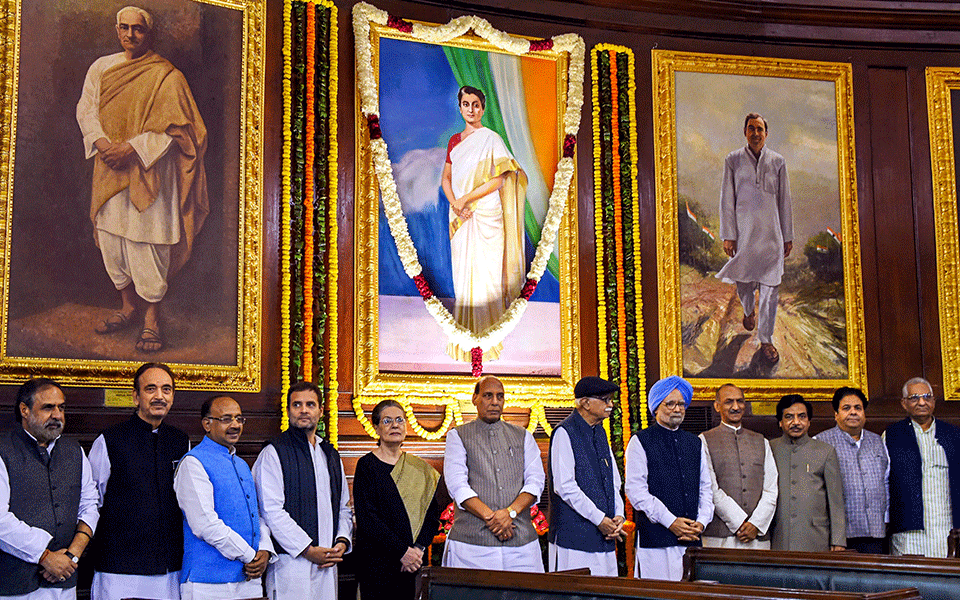


Political leaders, including PM Modi and Congress president Rahul Gandhi, paid tribute to the former Prime Minister, remembering her as an embodiment of strength and resilience. Indira Gandhi's transformative leadership and patriotism are still sources of inspiration for many. Her birth anniversary is a reminder of her contributions to India's progress and development.
Indira Gandhi: A Legacy of Strength and Resilience
Indira Priyadarshini Gandhi, the first and only female Prime Minister of India, was born on November 19, 1917. Her birth anniversary serves as a poignant reminder of her immense contributions to the nation's progress and development.
Early Life and Political Career
Born into a politically influential family, Gandhi's father, Jawaharlal Nehru, was the first Prime Minister of independent India. After completing her education in India and Europe, she joined the Indian National Congress and actively participated in the freedom struggle against British rule. Gandhi rose through the party ranks and held several important positions before becoming the Prime Minister in 1966.
Transformative Leadership
Gandhi's tenure as Prime Minister was marked by transformative policies and bold decisions. She spearheaded India's Green Revolution, which led to a significant increase in crop production. She also nationalized major industries and introduced progressive social reforms, including a ban on dowry. Gandhi's charisma and unwavering determination inspired a generation of Indians.
The Emergency
In 1975, facing growing political opposition and social unrest, Gandhi imposed a state of emergency. During this period, civil liberties were suspended, and dissent was suppressed. The Emergency was highly controversial and remains a subject of debate.
Assassination and Legacy
Gandhi's assassination on October 31, 1984, by Sikh separatists sent shockwaves across India and the world. She was remembered as a symbol of strength and resilience. Her legacy continues to inspire leaders and ordinary citizens alike.
FAQs
1. What are Indira Gandhi's most significant accomplishments?
Indira Gandhi's major accomplishments include:
2. Why did Gandhi impose the Emergency?
Gandhi imposed the Emergency in 1975 to quell political opposition and social unrest. She argued that it was necessary to restore law and order and prevent the country from slipping into chaos.
3. How was Gandhi assassinated?
Gandhi was assassinated on October 31, 1984, by two Sikh bodyguards in retaliation for her decision to send troops into the Golden Temple to quell the Sikh separatist movement.
4. What is Gandhi's legacy today?
Gandhi's legacy is complex and multifaceted. She is remembered as a strong and decisive leader who transformed India's economic and social landscape. However, her decision to impose the Emergency remains a controversial aspect of her legacy.
5. How is Gandhi's birth anniversary celebrated?
Gandhi's birth anniversary is celebrated as Bal Diwas (Children's Day) across India. Schools and organizations host cultural programs and events to commemorate her contributions and inspire future generations.

Government officials in the UK are facing backlash from citizens as Storm Bram brings heavy rain and winds, leading to flood warnings and potential risks to life. Good Morning Britain presenters Richard Madeley and Susanna Reid raised concerns about the lack of warning to those living in affected areas, while viewers expressed frustration over inconsistent warning systems. With severe weather conditions expected to continue throughout the country, citizens are calling for better communication and preparation from their government.

A shocking conspiracy was uncovered by the Bihar Police when they arrested an individual from Bhojpur for allegedly issuing death threats to MP Pappu Yadav. The whole scheme was concocted by his close associates to garner enhanced security for Yadav. The arrested man, Ram Babu, has confessed to making a threatening video at the behest of the MP's associates, who had promised him a position in their party. Police are still investigating the instigator of this plot and are also looking into other aspects of the case.

Congress-led UDF emerged as the leading force in the Kerala local body elections, securing a majority in 505 out of 941 Grama Panchayats. Meanwhile, the BJP-led NDA made significant gains, winning the Thiruvananthapuram Corporation for the first time and retaining key municipalities. Union Home Minister Amit Shah credited the victories to PM Narendra Modi's leadership and vision for "Vikasita Keralam".

In a significant victory for the Aam Aadmi Party (AAP), three women candidates secured seats in the Kerala local body elections. Former Mayor and MCD AAP Councillor Dr. Shelly Oberoi congratulated the winners, praising their success as a strong example of women's empowerment. Meanwhile, Congress president Mallikarjun Kharge expressed his gratitude to the people of Kerala for giving a decisive verdict in favor of the United Democratic Front (UDF), while Prime Minister Narendra Modi acknowledged and praised the efforts of BJP workers in the state. This outcome reflects the increasing support for female leaders and potentially hints at a greater shift towards progressive politics in the state.

As the counting for the local body elections in Kerala began, the Congress-led UDF is in the lead in most of the city and town local bodies. This two-phase election, held on December 9 and 11, has seen a high voter turnout of over 70%. The results of this election will have a significant impact on the political landscape ahead of the 2026 Assembly elections in Kerala, with local body results often reflecting voter mood. Congress president Mallikarjun Kharge has expressed confidence in the UDF alliance's chances in the upcoming Assembly polls.

R Sreelekha, the former DGP and BJP's mayoral candidate in Thiruvananthapuram Corporation, secured a victory in the Sasthamangalam ward and pledges to deliver a corruption-free administration if given the chance to serve the public. Other notable victories in the corporation elections include former district president VV Rajesh and UDF mayoral candidate KS Sabarinathan. However, some high-profile defeats were seen, including actor Poojapura Radhakrishnan and Congress leader Johnson Joseph. Independent candidate Pattoor Radhakrishnan and Congress candidate Mary Pushpam also emerged victoriously in their respective wards.

According to sources, the Special Intensive Revision (SIR) exercise in West Bengal has identified a total of 58,80,202 voters who may be excluded from the draft voter list. This includes people who have passed away, transferred, missing, and identified as 'fake' by the Election Commission. These numbers are subject to change in the final list, which is set to be published on February 14, 2022. The commission has divided voters into three categories - own mapping, progeny mapping, and non-mapping - depending on their presence in the 2002 voter list. Those not falling into any of these categories will be called for a hearing by the EC.

In a significant shift in voter sentiment, the Congress-led United Democratic Front (UDF) is set for a decisive win in the Kerala local body elections, dealing a major setback to the ruling CPM-led Left Democratic Front (LDF) ahead of the 2026 Assembly elections. The UDF has consolidated its gains across urban local bodies, while the LDF's last-minute welfare push failed to curb anti-incumbency. The NDA also made significant gains, underlining its expanding presence in urban Kerala.

In a major upset, the BJP-led NDA has won the Thiruvananthapuram Municipal Corporation, ending the CPI(M)-led LDF's 45-year reign. The victory, with the NDA winning 50 out of 101 seats, is a boost for BJP's aspirations in Kerala's upcoming Assembly elections. The party's strong focus on development and Hindutva in Thiruvananthapuram, under the leadership of state unit president Rajeev Chandrasekhar, proved successful despite challenges faced during the campaigning. This victory has put the BJP in a strong position for the 2021 Assembly elections.

The Bharatiya Janata Party-led National Democratic Alliance (NDA) has taken a huge lead in Thiruvananthapuram Municipal Corporation, giving a setback to the ruling Left Democratic Front (LDF). Initial trends show the NDA leading in 25 wards, while the LDF is ahead in 15 wards and the UDF in 10 wards. This is a major blow to the LDF ahead of the upcoming assembly elections in Kerala, with a record voter turnout of 73.69%. The State Election Commission has also commended the peaceful conduct of the elections.